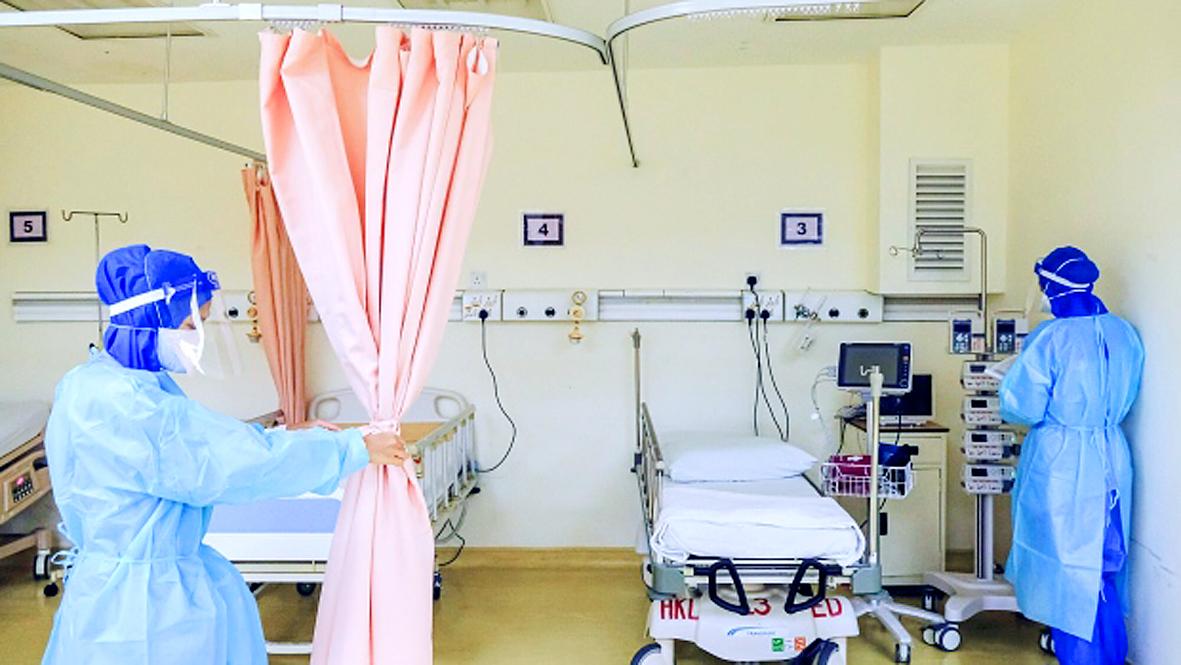Rising COVID-19 cases are threatening to overstrain Malaysia’s crowded hospitals and the Philippines reopened its COVID-19 treatment wards amid a surge in Southeast Asia, underscoring the need for governments to adjust to the disease’s ebb and flow in a world now living with the virus.
As of Saturday last week, more than 70 percent of government hospital beds in Malaysia were occupied, up more than 20 percentage points from a week earlier.
Authorities have appealed to anyone testing positive to abide by a mandated seven-day quarantine in an effort to stem the pressure on its medical system.

Photo: Bloomberg
The jump is being fueled by gatherings over the recent long Hari Raya Aidilfitri holiday, with the country also recording 20 deaths in the two weeks to Saturday — 25 percent more fatalities than the previous 14 days.
In the Philippines, positive rates among people tested jumped from just 7 percent at the start of last month to 17 percent by the end of the month. The Philippine Department of Health has since asked hospitals to reopen COVID-19 treatment facilities in a bid to curb the spike in cases, despite more than 80 percent of the nation’s regular hospital beds and intensive care units sitting empty.
Cases have also risen in Vietnam, which has reimposed some pandemic-era restrictions in key cities. Indoor mask-wearing mandates have since late last month been in effect in public spaces in the capital, Hanoi, while commercial hub, Ho Chi Minh City, has ordered masks to be worn again on school campuses.
In Singapore, rising demand from an aging population had by the end of last month driven up waiting times for admission to hospital wards to seven hours — up from five hours just two weeks ago — the Singaporean Ministry of Health said. A rise in COVID-19 hospitalizations in the city-state only stands to fuel the strain.
The surge comes as healthcare systems in Southeast Asia have already been under strain following years of the pandemic, so the prospect of hospital resources coming under further pressure is ringing officials’ alarm bells.
One of the biggest sources of pressure is acute medical staff shortages, following COVID-19-era exoduses over grueling hours and low pay.
Developing nations in the region, including the Philippines — the world’s biggest exporter of nurses — are also disadvantaged in a global bidding war for doctors, nurses and other personnel by deeper-pocketed countries similarly in need of medical workers.

Chinese President Xi Jinping (習近平) is to visit Russia next month for a summit of the BRICS bloc of developing economies, Chinese Minister of Foreign Affairs Wang Yi (王毅) said on Thursday, a move that comes as Moscow and Beijing seek to counter the West’s global influence. Xi’s visit to Russia would be his second since the Kremlin sent troops into Ukraine in February 2022. China claims to take a neutral position in the conflict, but it has backed the Kremlin’s contentions that Russia’s action was provoked by the West, and it continues to supply key components needed by Moscow for

Japan scrambled fighter jets after Russian aircraft flew around the archipelago for the first time in five years, Tokyo said yesterday. From Thursday morning to afternoon, the Russian Tu-142 aircraft flew from the sea between Japan and South Korea toward the southern Okinawa region, the Japanese Ministry of Defense said in a statement. They then traveled north over the Pacific Ocean and finished their journey off the northern island of Hokkaido, it added. The planes did not enter Japanese airspace, but flew over an area subject to a territorial dispute between Japan and Russia, a ministry official said. “In response, we mobilized Air Self-Defense

CRITICISM: ‘One has to choose the lesser of two evils,’ Pope Francis said, as he criticized Trump’s anti-immigrant policies and Harris’ pro-choice position Pope Francis on Friday accused both former US president Donald Trump and US Vice President Kamala Harris of being “against life” as he returned to Rome from a 12-day tour of the Asia-Pacific region. The 87-year-old pontiff’s comments on the US presidential hopefuls came as he defied health concerns to connect with believers from the jungle of Papua New Guinea to the skyscrapers of Singapore. It was Francis’ longest trip in duration and distance since becoming head of the world’s nearly 1.4 billion Roman Catholics more than 11 years ago. Despite the marathon visit, he held a long and spirited

The pitch is a classic: A young celebrity with no climbing experience spends a year in hard training and scales Mount Everest, succeeding against some — if not all — odds. French YouTuber Ines Benazzouz, known as Inoxtag, brought the story to life with a two-hour-plus documentary about his year preparing for the ultimate challenge. The film, titled Kaizen, proved a smash hit on its release last weekend. Young fans queued around the block to get into a preview screening in Paris, with Inoxtag’s management on Monday saying the film had smashed the box office record for a special cinema